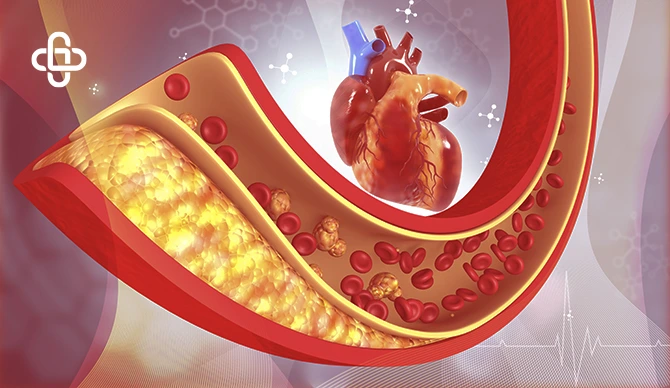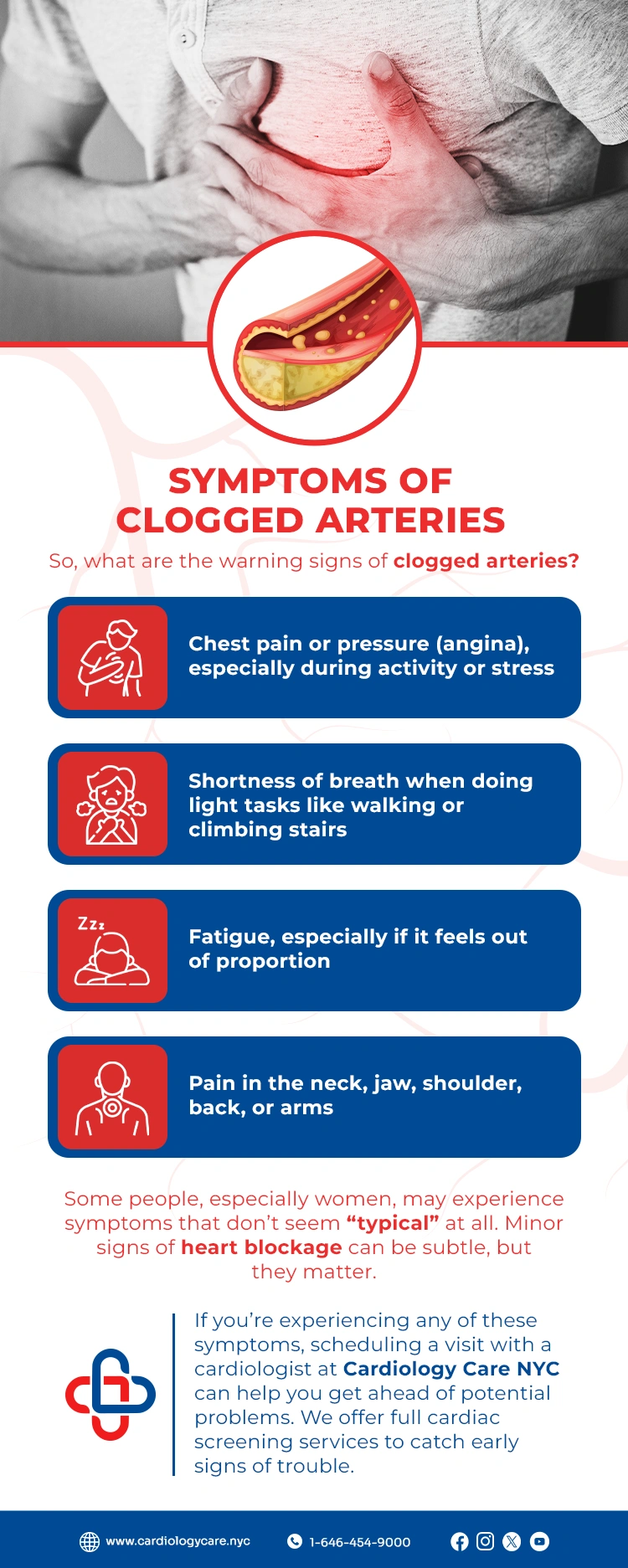Tightness in your chest or shortness of breath—could it be clogged arteries?
Clogged arteries (atherosclerosis) build up silently and can limit blood flow, often without symptoms, until it’s serious.
In this post, we’ll cover what clogged arteries are, how they cause heart attacks, key symptoms, and available tests and treatments. If you’re in NYC, Cardiology Care NYC offers trusted heart health screenings and cardiology consultations.
Table of contents
What Are Clogged Arteries?
Clogged arteries happen when plaque, a sticky mix of cholesterol, fat, calcium, and other substances, builds up along the walls of your arteries. This condition is called atherosclerosis.
Over time, this plaque hardens and narrows your arteries, especially the coronary arteries that feed your heart. That narrowing limits the amount of oxygen-rich blood reaching your heart muscle.
Here’s the dangerous part: if a plaque ruptures, your body may treat it like an injury and form a blood clot. If the clot fully blocks an artery, that’s a heart attack.
Symptoms of Clogged Arteries
So, what are the warning signs of clogged arteries?
- Chest pain or pressure (angina), especially during activity or stress
- Shortness of breath when doing light tasks like walking or climbing stairs
- Fatigue, especially if it feels out of proportion
- Pain in the neck, jaw, shoulder, back, or arms
Some people, especially women, may experience symptoms that don’t seem “typical” at all. Minor signs of heart blockage can be subtle, but they matter.
If you’re experiencing any of these symptoms, scheduling a visit with a cardiologist at Cardiology Care NYC can help you get ahead of potential problems. We offer full cardiac screening services to catch early signs of trouble.
How Do Clogged Arteries Lead to a Heart Attack?
Here’s what actually happens:
- A narrowed artery restricts oxygen and nutrients to the heart muscle
- Over time, that muscle becomes strained and weakened
- If a plaque ruptures, it can form a clot that blocks the artery entirely
That total blockage cuts off blood flow, and the part of the heart fed by that artery starts to die. That’s a heart attack, also called a myocardial infarction.
Even partial blockages can cause angina and long-term heart damage if not addressed.
How Are Clogged Arteries Diagnosed?
This is where tests come into play. Depending on your symptoms and risk factors, your doctor may order:
- Echocardiogram: A sonogram of the heart. It shows structure and function but doesn’t directly show blockages.
- Stress test: Monitors heart performance during exercise or medication-induced exertion.
- CT angiography or cardiac catheterization: These directly visualize the arteries and any blockages.
- Blood tests: Check for high cholesterol or signs of inflammation.
- Blood pressure screening: High blood pressure can damage arteries over time.
At Cardiology Care NYC, we offer all these diagnostic options, plus nuclear cardiology for deeper insights, so you can get clarity and peace of mind without delay.
Clogged Arteries vs Clogged Veins
Let’s clear this up:
- Arteries carry oxygen-rich blood away from the heart
- Veins carry blood back to the heart
Clogged arteries are a big concern when we talk about heart attacks and strokes.
Clogged veins are usually related to conditions like deep vein thrombosis (DVT) or chronic venous insufficiency, which can cause pain, swelling, and other complications, but they don’t usually lead to heart attacks.
Treatment Options for Clogged Arteries
Lifestyle changes:
- Eat a heart-healthy diet (think Mediterranean-style)
- Get regular physical activity
- Quit smoking and manage stress
Medications can include:
- Statins to lower cholesterol
- Blood thinners to reduce clot risk
- Beta-blockers or ACE inhibitors to manage blood pressure
Catching and treating artery disease early can make all the difference. That’s why Cardiology Care NYC emphasizes early detection, personalized care, and follow-through. Our comprehensive cardiac tests and cardiovascular screening programs are designed to give you answers and peace of mind.
Conclusion
Clogged arteries may not show obvious symptoms but can lead to serious heart issues. The good news? You can take action. Stay on top of your heart health with regular screenings, especially if you notice fatigue or chest discomfort. For trusted care, book a consultation with Cardiology Care NYC.
Frequently Asked Questions
Can clogged arteries affect mental clarity or memory?
Yes, reduced blood flow from clogged arteries can affect brain function over time, potentially leading to memory issues or brain fog, especially if other risk factors like high blood pressure or diabetes are present.
Are artery blockages always permanent?
Not always. In early stages, lifestyle changes and medications can stabilize or even slightly reduce plaque buildup. Severe blockages, however, often require procedures to restore full blood flow.
Do clogged arteries always start in the heart?
No. While coronary arteries are commonly affected, atherosclerosis can occur in arteries anywhere in the body, including those in the legs (peripheral artery disease) or brain (carotid artery disease).
Is there a genetic link to artery blockages?
Yes, family history plays a strong role. If close relatives had heart disease or strokes at a young age, your risk for clogged arteries is significantly higher, even if you’re otherwise healthy.
Can younger adults develop clogged arteries?
Absolutely. While age increases risk, poor lifestyle habits, like smoking, high-stress levels, or a sedentary routine, can lead to early-onset atherosclerosis, even in people under 40.
Disclaimer
This blog is for informational & educational purposes only and does not intend to substitute any professional medical advice or consultation. For any health-related concerns, please consult with your physician, or call 911.

